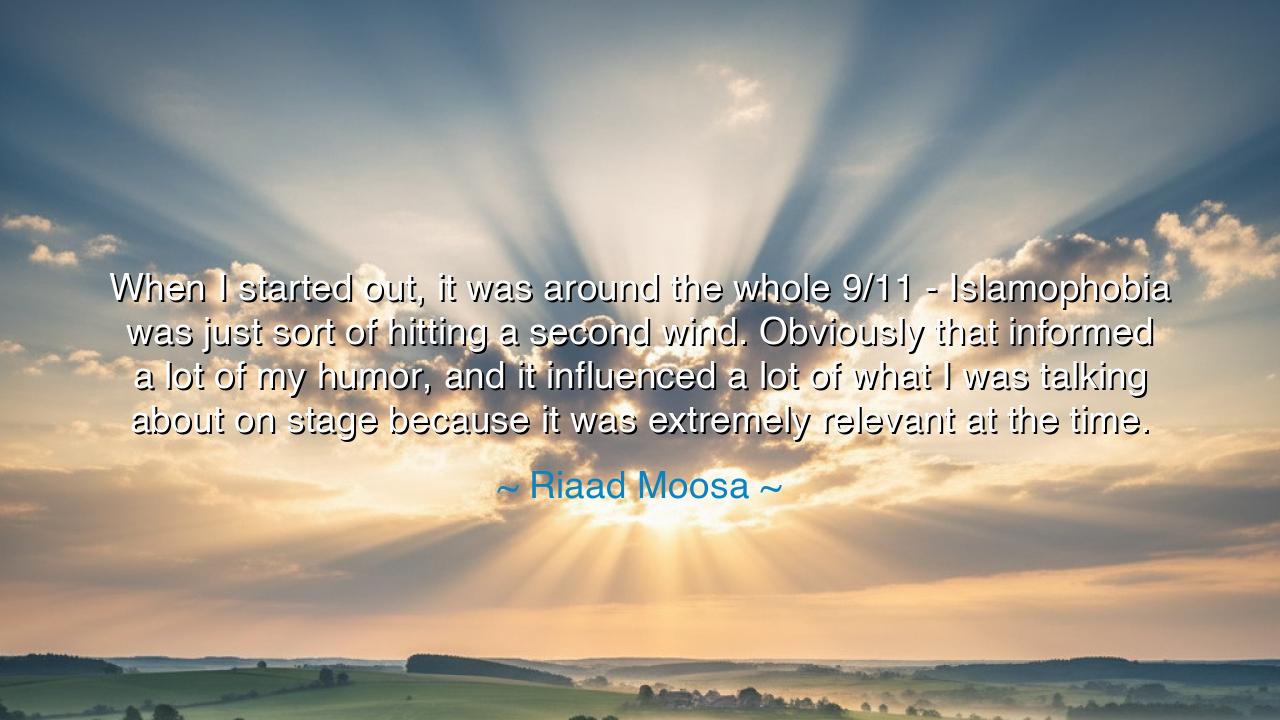
When I started out, it was around the whole 9/11 - Islamophobia
When I started out, it was around the whole 9/11 - Islamophobia was just sort of hitting a second wind. Obviously that informed a lot of my humor, and it influenced a lot of what I was talking about on stage because it was extremely relevant at the time.






Hear the voice of Riaad Moosa, the healer turned jester, the physician who found truth not in prescriptions but in laughter: “When I started out, it was around the whole 9/11 — Islamophobia was just sort of hitting a second wind. Obviously that informed a lot of my humor, and it influenced a lot of what I was talking about on stage because it was extremely relevant at the time.” In these words, there lies the testimony of a man who transformed pain into comedy, prejudice into perspective, and division into dialogue. For Moosa understood that laughter, like light, can reveal the humanity that fear seeks to hide.
The origin of this quote arises from the crucible of history itself — the early years of the twenty-first century, when the world stood trembling after the fall of the Twin Towers. In that moment of terror, suspicion spread across nations like a shadow, and the word “Muslim” became, to many, a symbol of fear. Riaad Moosa, a South African of Indian descent and a man of faith, found himself standing at the intersection of identity and misunderstanding. Yet rather than fight with anger or retreat in silence, he chose the path of the comedian — the sacred fool who speaks truth through laughter. For in humor lies disarming power; it can bridge the unbridgeable, soften the hardest heart, and make even the oppressor see the absurdity of his prejudice.
In this, Moosa followed the footsteps of the ancient satirists — those wise jesters who wielded wit as a weapon of enlightenment. The Roman Horace once said that ridicule can heal where reprimand cannot, and Moosa’s laughter carried the same spirit. He stood before audiences burdened by fear and suspicion, and through his jokes, he revealed the shared frailty of the human condition. His humor did not mock, but illuminated. He spoke of misunderstandings and stereotypes not to wound, but to expose how small they truly were beside the vastness of our shared humanity. Thus, in the face of Islamophobia, he chose not bitterness, but balance — not outrage, but insight.
Consider the story of Charlie Chaplin, who in 1940 created The Great Dictator while fascism was tightening its grip upon Europe. At a time when tyranny sought to crush dissent, Chaplin made the world laugh — and in that laughter, he awakened its conscience. Through the power of satire, he mocked fear itself, turning its menace into absurdity. So too did Riaad Moosa rise in a world trembling with suspicion, using comedy as resistance, laughter as liberation. Both men proved that when truth is forbidden and hatred reigns, the comedian becomes the last philosopher — the one who reveals through jest what others dare not speak aloud.
Moosa’s words remind us that relevance is the soul of art. He did not choose his subjects for comfort, but for necessity. In times of tension, the artist must mirror the world as it is — not as the powerful wish it to be. For to make people laugh about their fears is to help them confront them. His humor became a balm for wounds both personal and collective. Through it, he reclaimed dignity for his faith and compassion for his audience, showing that even in an age of suspicion, laughter could still unite where politics divided.
But there is also humility in his reflection. Moosa does not claim to have been a crusader or prophet; he simply followed the pulse of his time, as every true artist must. “It was extremely relevant,” he says — a simple statement, yet profound. For relevance is the meeting point between art and truth. The performer who ignores the suffering of his age loses his audience’s soul, but the one who speaks to their fears wins their trust. In this way, Moosa teaches us that every voice, however small, must rise to meet the moment it lives in — that silence in the face of injustice is complicity, but laughter in the face of ignorance is courage.
O listener, take this teaching as a lamp for your own journey. When you face misunderstanding, do not harden your heart — speak with clarity, and if you can, with humor. For laughter is not the enemy of seriousness; it is the doorway to understanding. Learn to use your voice not to divide, but to reveal. When the world darkens with fear, be as Riaad Moosa — bring light not through argument, but through empathy disguised as jest. In laughter, enemies may find friendship; in humor, the heart may heal what reason cannot.
Thus, let his words endure: “Humor is a great way to break out of convention.” For when hatred binds the human spirit, laughter is the sword that cuts it free. Riaad Moosa stands among those few who turned suffering into song, suspicion into sincerity, and fear into fellowship. Let us, too, learn this ancient wisdom — that the truest laughter is born not from mockery, but from love; not from superiority, but from the courage to see ourselves in one another.






AAdministratorAdministrator
Welcome, honored guests. Please leave a comment, we will respond soon